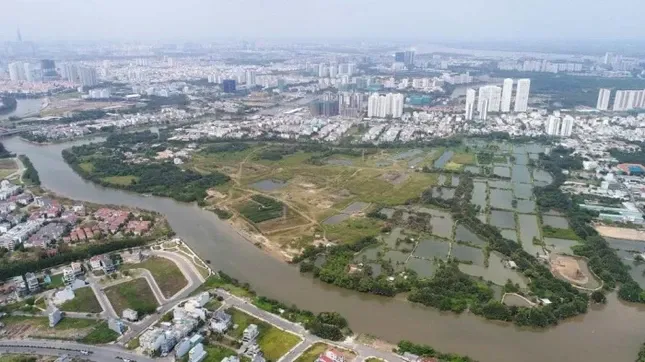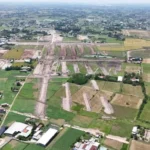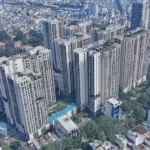The Fault Doesn’t Lie with Businesses
Mr. Dang Hong Anh, Chairman of the Vietnam Young Entrepreneurs Association, shared concerns about certain provisions in the Government’s draft decree amending and supplementing a number of articles of Decree No. 103/2024/ND-CP on land use fees and land rental.
Specifically, the draft continues to impose an additional tax rate of 5.4% per year on land use fees not yet paid during the period before land costs are finalized. This not only creates an absurd situation but also poses legal and economic risks for businesses.
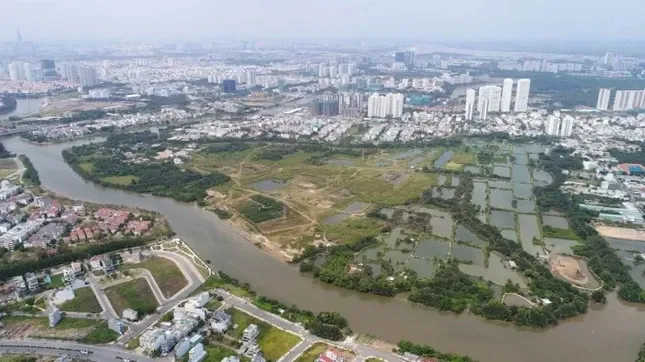
The draft decree continues to impose an additional 5.4% tax rate on unpaid land use fees, creating potential legal risks.
According to Mr. Dang Hong Anh, the additional collection of 5.4%/year is essentially an interest or late payment penalty applied to the period when enterprises have not yet completed their financial obligations regarding land. However, the reason for the delay is not due to the enterprises’ procrastination but the authorities’ pending land valuation and cost calculation.
“Apart from tax pressures, enterprises also face challenges as projects that have not fulfilled financial obligations will not be eligible for subsequent legal procedures, from mortgage loans to product sales,” said Mr. Dang Hong Anh.
As a consequence, businesses bear significant losses and face the risk of cash flow deadlock. Projects cannot be implemented, capital cannot be raised, opportunity costs are lost, and financial costs continue to rise. All these factors create a double burden, potentially pushing enterprises towards bankruptcy or forcing them to halt their projects.
“If enacted, this regulation will make investors hesitant to undertake projects requiring large land areas and lengthy land cost calculation processes,” Mr. Dang Hong Anh observed.
Regarding cases where businesses are affected by delays in land valuation and cost calculation by authorities, Mr. Hong Anh suggested that the additional collection should be completely abolished, and administrative responsibility should be clearly assigned to the land price determination agency.
Increasing Input Costs
Similarly, Mr. Le Hoang Chau, Chairman of the Ho Chi Minh City Real Estate Association, affirmed the need to amend Decree 103/2024/ND-CP to eliminate “contradictory” provisions, in line with the Government’s commitment to removing obstacles for real estate businesses.
“Despite bearing no fault, enterprises are subject to late payment interest. This increases input costs and hinders the recovery of the real estate market. If not promptly addressed, housing supply will remain obstructed, negatively impacting the economy. Penalties should only be imposed when the tax authority has completed the notification of financial obligations and the enterprise fails to pay by the deadline. It is unreasonable to blame enterprises when the cause lies in the delay by the competent authorities,” said Mr. Chau.
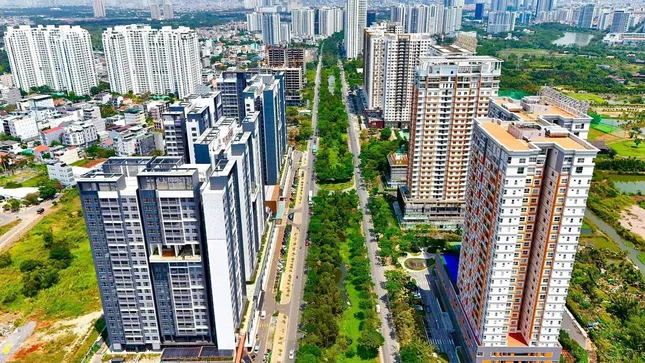
It is unreasonable to impose late payment interest on enterprises when they are not at fault.
Mr. Chau emphasized that urgently amending Decree 103 aligns with the instructions of General Secretary To Lam regarding the imperative to review and address bottlenecks caused by legal regulations.
“It is crucial to focus on reviewing and addressing bottlenecks caused by legal regulations, especially contradictory, overlapping, unreasonable, or impractical provisions, as well as ambiguous rules that lead to multiple interpretations within the legal system. This is an urgent task that demands immediate and decisive action,” Mr. Chau stated.
The Chairman of the Ho Chi Minh City Real Estate Association added that land price determination and land use fee payment are prerequisite procedures for enterprises to obtain commercial land use rights. Therefore, adhering to the Prime Minister’s directives, HoREA proposes that the Ministry of Finance may not need to wait for the amendment of Article 257 of the 2024 Land Law to revise Articles 50 and 51 of Decree 103. Instead, the government agency should recalculate the period used as the basis for supplementary land fee payment.
Mr. Chau suggested that the Ministry of Finance should only stipulate the supplementary land use fee payment from August 1, 2024 (the effective date of the 2024 Land Law) until the date of the decision approving the land price, excluding the 180-day period for land price determination as per Clause 4, Article 155 of the 2024 Land Law. For cases before this period, the regulation should be amended to waive the supplementary amount for the period before land price determination.
“Amending the regulation in this way will not only be appropriate for the current circumstances but also resolve the challenges faced by enterprises, demonstrating the government agency’s thoroughness in reviewing and amending inconsistent provisions,” affirmed Mr. Chau.
The Housing Authority’s Rationale for High Social Housing Prices
The Director of the Department of Housing and Real Estate Market Management acknowledged that there are multiple factors contributing to the rising costs of social housing. These include infrastructure, management, operational, interest, and material expenses, among other variables.
Transforming Land Usage: A Hefty 300% Rise in Fees
The new land pricing policy has resulted in a significant increase in taxes for those wishing to change their land usage. With a 250-300% surge in taxes for converting agricultural land to residential use, many individuals are now facing financial challenges due to the substantial rise in land use conversion costs.

